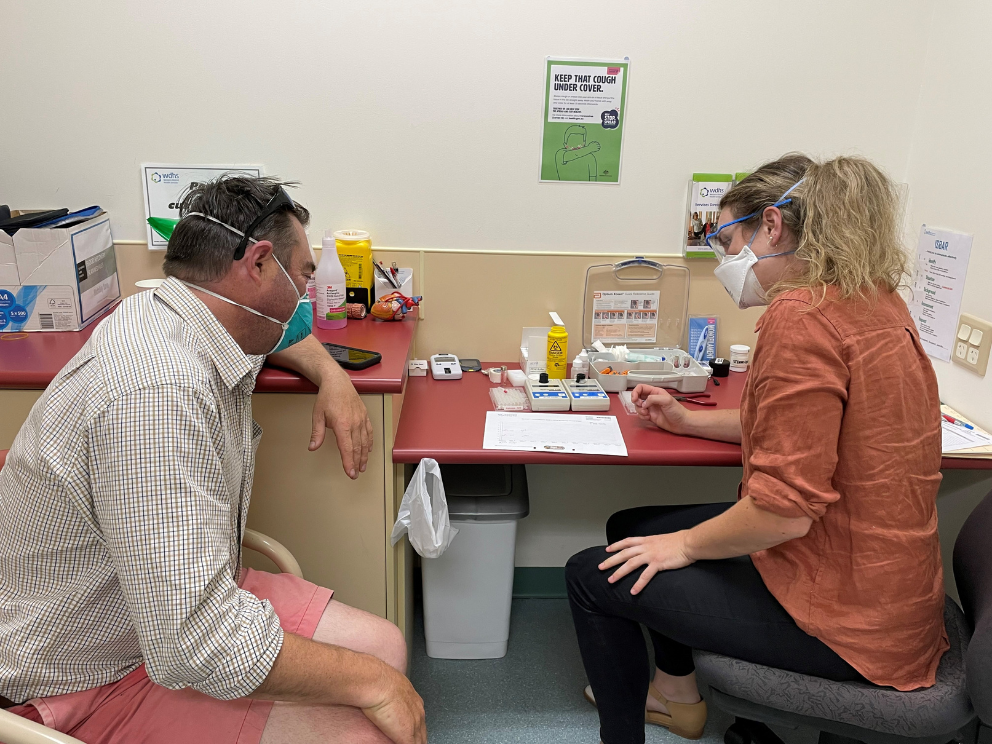
Written by Jackelyn Villegas for Rural Health Pro. Read the original publication here.
The National Centre for Farmer Health (NCFH) developed AgriSafe AgriClinics to give farmers the opportunity to undertake a comprehensive health check with a clinician specially trained in farmer health.
According to a 10-year study by the National Rural Health Alliance, one farmer commits suicide every 10 days in Australia. Alongside poor mental health, farmers experience increased risk of injury and their workplace exposes them to potentially harmful agrichemicals. With this in mind, it is especially important that farmers in rural and remote areas have access to quality health services tailored to the specific concerns of those working in the agricultural industry.
The National Centre for Farmer Health (NCFH) developed AgriSafe AgriClinics to give farmers the opportunity to undertake a comprehensive health check with a clinician specially trained in farmer health. AgriClinics are 90 minute, free-of-charge consults available to anyone working in the Victorian agricultural sector. AgriClinics seek to assess farmers’ health with an in-depth health assessment as well as provide education on hazards around the farm and personal protective equipment use.
Consultations include a range of tests including blood glucose and lipid testing, hearing and vision testing, skin examination, urine testing and agrichemical exposure (anticholinesterase) testing. AgriSafe Clinicians also fit test farmers with a mask or respirator and complete an occupational risk assessment.
Since 2011, AgriSafe has delivered 368 clinics to farmers in rural Victoria. They currently serve the communities of Hamilton, Penshurst, Harrow, Shepparton, Dookie, Nathalia, Numurkah, Tatura, Kerang, Cohuna, Boort, Quambatook and Pyramid Hill.
AgriSafe Clinician Megan Little said AgriClinics have been very popular within the farming community.
“AgriSafe came about as there was a need for a tailored service for farmers, they are a hard-to-reach population due to geographical isolation and a lack of resources.
“The clinics have had a really good uptake in their first few years. It gets spread via word of mouth and I will often have farmers in the clinic who reach out to us and book in because their mate had a consult done and they want to find out more.
“Some farmers you have to push a little bit to get them in here, but once they’re here, they really find the service valuable,” Megan said.
Megan is a Registered Nurse who completed postgraduate studies aligning with her interest in farmer health. She studied a Graduate Certificate of Agricultural Health and Medicine through Deakin University and the NCFH. She now runs the AgriSafe clinic in Hamilton and Harrow and said AgriClinics are particularly beneficial to farmers as they are highly specific to the health and safety of farmers.
“We get patients to do a survey before they come in. That gives us an idea of the type of farming they do, their lifestyle behaviours and their safety practices on the farm. Then we can really tailor the clinics specifically to their needs.
“In the 90 minutes, we do everything from blood pressure, your basics like height and weight and body fat percentage. We do a fasting blood glucose and a cholesterol test as well. We also do a unique test called cholinesterase testing. Cholinesterase is a nerve transmitter in our body and certain agrichemicals that we use on the farm will block or inhibit cholinesterase. That leads into a really good discussion about PPE and exposure to chemicals,” Megan said.
After an AgriClinic consult, clinicians prepare a letter of recommendations to farmers covering health, safety and behaviour changes. A letter is sent to the patient’s GP and farmers are encouraged to engage with other health professionals where needed. A follow-up consult is booked in one month after the initial consultation as part of the AgriSafe process.
“We get patients to come back a month later because we like to get three cholinesterase levels. That consult a month later is a good opportunity to catch up with them and see if they followed through with anything or if they’re having any challenges and troubleshoot with them. So it’s a really personalised, tailored clinic,” Megan said.
Farmer mental health is also a focus of the consults and Kessler Psychological Distress Scale (K10) screening tests are routinely carried out and patients with high scores are referred to their GP and supported with a range of resources from the NCFH, including free, online psychology sessions.
Megan said her role as an AgriSafe Clinician is highly rewarding as she has the opportunity to make a real difference to the health of rural and remote farmers.
“For nurses out there, I just think this is one of the best jobs in nursing. Every day, I’m using my brain and I am challenged intellectually and using different skills. I love chatting to farmers in my role, it’s always fun,” she said.
If you are interested in becoming an AgriSafe Clinician, contact the NCFH to discuss the requirements. Clinicians must be Registered Nurses and enrolled in the Graduate Certificate of Agricultural Health and Medicine. AgriClinics can be set up from general practices, bush nursing centres or community health hubs and the NCFH provide all the necessary support in setting up the clinic. Currently AgriClinics operate solely in Victoria, with plans to expand nationwide in the future.
|
|